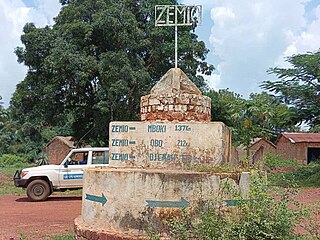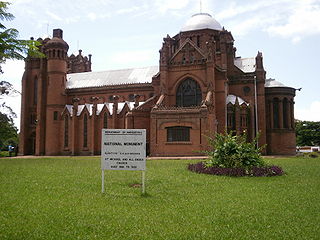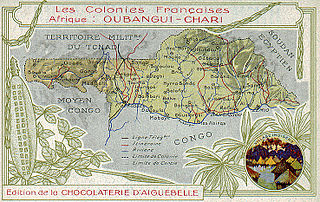Related Research Articles
Banda may refer to:

Malawi, officially the Republic of Malawi and formerly known as Nyasaland, is a landlocked country in Southeastern Africa. It is bordered by Zambia to the west, Tanzania to the north and northeast, and Mozambique to the east, south and southwest. Malawi spans over 118,484 km2 (45,747 sq mi) and has an estimated population of 19,431,566. Malawi's capital and largest city is Lilongwe. Its second-largest is Blantyre, its third-largest is Mzuzu and its fourth-largest is its former capital, Zomba. It was the first capital city of Malawi before being changed to Lilongwe.

Hastings Kamuzu Banda was the leader of Malawi from 1964 to 1994. He served as Prime Minister from independence in 1964 to 1966, when Malawi was a Dominion / Commonwealth realm. In 1966, the country became a republic and he became the first president as a result, ruling until his defeat in 1994.

Music of the Central African Republic includes many different forms. Western rock and pop music, as well as Afrobeat, soukous and other genres have become popular nationwide. The sanza is a popular instrument.
Aja is a Central Sudanic language spoken in the southern South Sudanese province of Bahr el Ghazal and along the South Sudanese border in the Central African Republic. Although the Aja are ethnically Kresh, their language is unintelligible to other Kresh languages. It is largely Banda in vocabulary, though it remains Kresh in structure. Most members of the tribe are bilingual in Kresh. Alternate spellings are Adja and Ajja.

A slit drum or slit gong is a hollow percussion instrument. In spite of its often being called a drum, it is not a true drum because it lacks a drumhead, the membrane stretched across the top of a true drum. It is classed instead as an idiophone in which the entire instrument vibrates.

The Banda people are an ethnic group of the Central African Republic. They are likewise found in the Democratic Republic of the Congo, Cameroon, and South Sudan. They were severely affected by slave raids of the 19th century and slave trading out of Africa. Under French colonial rule, most converted to Christianity but retained elements of their traditional religious systems and values.

Alindao is a town and sub-prefecture located in the Central African Republic prefecture of Basse-Kotto. It lies at the junction of the National Route 2 and 22. Alindao had a population of 14,401 as of the 2003 census; and a calculated 2013 population of 15,213. The town is the seat of the Roman Catholic Diocese of Alindao. It has a small airport, Alindao Airport. A Catholic Mission was established at Alindao during French occupation under French Equatorial Africa.
Banda is a family of Ubangian languages spoken by the Banda people of Central Africa. Banda languages are distributed in the Central African Republic, Democratic Republic of the Congo, and South Sudan.

Neukamerun was the name of Central African territories ceded by the Third French Republic to the German Empire in 1911. Upon taking office in 1907, Theodor Seitz, governor of Kamerun, advocated the acquisition of territories from the French Congo. Germany's only major river outlet from its Central African possessions was the Congo River, and more territories to the east of Kamerun would allow for better access to that waterway.
The Ubangian languages form a diverse linkage of some seventy languages centered on the Central African Republic and the DR Congo. They are the predominant languages of the CAR, spoken by 2–3 million people, including one of its official languages, Sango. They are also spoken in Cameroon, Chad, the Republic of Congo and South Sudan.

Zemio is a town and sub-prefecture in the Haut-Mbomou prefecture of the south-eastern Central African Republic. Zemio was the former capital of the Sultanate of Zemio before it was abolished in 1923 by France.
Central Banda is a dialect continuum of the Banda languages spoken by around one million people, primarily in the Central African Republic. The varieties may be mutually intelligible, especially the Mid-Southern–Gobu–Kpagua–Mono–Ngundu cluster. The other varieties are Bambari, Banda-Banda, Mbrès, Ndélé, and Togbo-Vara Banda.
South Banda is a dialect continuum of the Banda languages spoken by around 200,000 or so people, primarily in the Central African Republic but with ten thousand or so in the Democratic Republic of the Congo. The two varieties may be mutually intelligible.

The Malawi Defence Force is the state military organisation responsible for defending Malawi. It originated from elements of the British King's African Rifles, colonial units formed before independence in 1964.

According to the 2018 census, 77.3% of the population is Christian. Denominations include Roman Catholics at 17.2% of the total population, Central Africa Presbyterians at 14.2%, Seventh-day Adventist at 9.4%, Anglicans at 2.3%, Pentecostals at 7.6% and other denominations at 26.6%.
Marie Solange Pagonendji-Ndakala is a Central African Republic politician who is Minister of Family, Social Affairs and National Solidarity. During 2011, she served as President of the Gender, Human Rights Commission, at the National Assembly.

Dar al Kuti was an Islamic state in the center and northwest of the present Central African Republic which existed from around 1830 until 17 December 1912. From around 1800 the name Dar al-Kuti was given to a stretch of the frontier to the southwest of Wadai, a sultanate in the region of Lake Chad. The term "dar" signifies "abode" in Arabic, while the term "kuti" in the local language denotes a forest or densely-wooded area.
Yaj can refer to:

On 3 March 1982, opposition politician and leader of the MLPC party, Ange-Félix Patassé, returned from exile to the Central African Republic and staged an unsuccessful coup against General André Kolingba with the help of a few military officers, such as General François Bozizé, who accused Kolingba of treason and proclaimed the change of power in a radio announcement.
References
- ↑ Yangere at Ethnologue (18th ed., 2015) (subscription required)
- ↑ Kalck, Pierre (2005). Historical dictionary of the Central African Republic. Historical dictionaries of Africa (3. ed ed.). Lanham, Md.: Scarecrow Press. p. 5. ISBN 978-0-8108-4913-6.
{{cite book}}:|edition=has extra text (help)